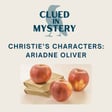Become a Creator today!Start creating today - Share your story with the world!
Start for free
00:00:00
00:00:01

Agatha Christie's Sleuths: Parker Pyne
This week, Brook and Sarah discuss Agatha Christie's character Parker Pyne. Is he a detective? Are his methods reasonable if they bring happiness?
Pyne appeared in 14 short stories in the 1930s, though many of the stories had different names when they appeared in US and the UK publications.
Discussed
Parker Pyne Investigates (1934)
The Regatta Mystery and Other Stories (1939)
Death on the Nile (1937)
And Then There Were None (1939)
Murder on the Orient Express (1934)
Parker Pyne stories
For more information
Instagram: @cluedinmystery
Contact us: hello@cluedinmystery.com
Music: Signs To Nowhere by Shane Ivers – www.silvermansound.com
Website
Transcript
Transcript
Introduction to Agatha Christie's Lesser-Known Sleuths
00:00:12
Speaker
Welcome to Clued in Mystery. I'm Sarah. And I'm Brooke. And we both love mystery. Hi Brooke. Hi Sarah. Are you ready to talk about some of Agatha Christie's lesser known sleuths today?
00:00:28
Speaker
Absolutely. So as you referred to, we are going to talk today a little bit about Parker Pine. So our listeners will remember from the first season, we have talked about Agatha Christie and her life and her incredible contribution to the mystery space, but we really haven't spent any time talking about
00:00:54
Speaker
any of her stories or her sleuths. And so we thought we would start to address that. And today we're going to talk about Parker Pine. So Jay Parker Pine appears in 14 short stories, all of which were published in the 1930s.
00:01:11
Speaker
12 were released in late 1934 in a collection titled Parker Pine Investigates. That was the UK version and Parker Pine Detective is the US version. These collections were published after the stories first appeared in magazines or newspapers in 1932 and 1933.
Parker Pine's Character and Methodology
00:01:31
Speaker
The remaining two short stories were published in the collection The Regatta Mystery and Other Stories in 1939. Somewhat confusingly, Pine replaces Poirot as the sleuth in the story titled The Regatta Mystery, with the original Poirot version appearing in 1935.
00:01:48
Speaker
The names of several stories also changed between the magazine and anthology versions or between publication in the US or the UK. So I think I will try to put together a table to include in the show notes and on our website to list the alternate names and the original publication dates. Now, given when they were published, I'm sure you're not surprised when I say that the character descriptions and characterizations are often racist, sexist, and include negative descriptions of weight and appearance.
00:02:18
Speaker
So Parker Pine, and there's a bit of confusion about whether his first initial is J or C, but I'll just mostly refer to him as Parker Pine, spent 35 years working as a government statistician before opening his practice to cure unhappiness and often includes a statistic or reference statistics related to the story.
00:02:41
Speaker
While he is billed as a detective or an investigator, Pine insists several times that he is not a detective. Instead, he is interested in matters of the heart. This is especially true of his stories that are set in London, but in several of his other stories that are set abroad, he often performs what we would consider more traditional detective work, uncovering a theft or solving a murder.
00:03:06
Speaker
Though Pine and Poirot never meet, they do travel to several of the same destinations and interact with the same people. For example, Pine has a story titled, A Death on the Nile, which is completely different from Poirot's novel, Death on the Nile. Miss Lemon and Ariadne Oliver, two characters that Poirot readers may be familiar with, appear in Parker Pine's stories as his employees, and I think that those were actually published before the Poirot stories.
00:03:33
Speaker
Pine also has other recurring characters to help him. Claude Littrell, who is described as a handsome lounge lizard, and Madeline de Sarah, who is described as a vamp. Pine uses both in disguise to help those seeking his services come to some realization about love or happiness. Though I have to say, he doesn't always offer the best advice. In one instance, he tells a client to be less kind to his wife so that she will love him more because women want to be lied to.
Parker Pine vs. Poirot: A Comparative Discussion
00:04:00
Speaker
And he often engages in some sort of deception and
00:04:03
Speaker
the occasional kidnapping. He attracts clients through a personal ad that reads, are you happy? If not, consult Mr. Parker Pine, 17 Richmond Street. And the ad works, bringing him clients in the London stories and is often referenced in the stories when Parker Pine is abroad. He refers to his theory that unhappiness has five sources, each of which can be solved. But there, I didn't notice any explanation of what those
00:04:32
Speaker
sources are. But I would, I think if I reread the stories really carefully, each time he references that, I think maybe the story is an example of a different source of unhappiness.
00:04:46
Speaker
So Sarah, you mentioned that there was a story where Parker Pine replaced Poirot and I was looking and realized that both Poirot and Parker Pine have their own death on the Nile. So that was super interesting to me too.
00:05:03
Speaker
Yeah, so Parker Pine replaces Poirot in The Regatta Mystery. So I read both. I read the original Poirot version and I read the Parker Pine version and they are very, very similar. And so I don't know what the rationale for that switch was. I do think it's interesting that she could just make that switch.
00:05:25
Speaker
And I think that's the story where Parker Pine or Poirot really only appears in the last bit of the story. And so I guess that's why it was really easy to make that switch because it wasn't really integral to the story. And
00:05:47
Speaker
Yeah, I don't know. It's really interesting. I don't know of any other example where that happens. And then for Death on the Nile, yeah, so they both have a story titled Death on the Nile. But they're very different in
Settings and Their Influence on Parker Pine Stories
00:06:05
Speaker
terms of the solution and the story. And the Poirot one is the novel and the Parker Pine is a short story.
00:06:15
Speaker
But both of those characters travel to a lot of the same destinations. So, yeah, I don't know why. Given all of the different variations in the names of the Parker Pine stories that, you know, one story published in the UK had a different title when it was published in the US, and that happened multiple times.
00:06:38
Speaker
The Parker Pines Death on the Nile story was published before the Poirot novel. And maybe she just thought it was such a great title that she had to use it again. Nice, nice. And as you say, they traveled to a lot of the same places. And these were the places that she and Max Malowin were traveling at this time in their life. So they're all crossing paths. I think that's lovely.
00:07:04
Speaker
Yeah, I think that's a great point that their travels kind of parallel some of the experiences that she was having.
00:07:11
Speaker
So Brooke, have you read any of the Parker Pine stories? I hadn't until this week. I read, um, the case of the middle-aged wife to, uh, to, you know, to get a taste of Parker Pine this week, but it was not a sleuth that I was familiar with of Christie's at all. And, um, it was a lot of fun. It was so different than any of her other work that I'd read.
00:07:37
Speaker
Yeah, and I would say, I mean, you're right. His stories are completely different from a lot of what we typically associate with Agatha Christie. And his stories are also different depending on where they take place. So the ones that are in London really are, like I mentioned, about helping someone who's either dissatisfied in their life or having some romantic
00:08:06
Speaker
relationship troubles, whereas the ones where he's abroad, they would be more traditional kind of mysteries. You know, there's several jewelry thefts, a couple of murders. Yeah, so he's a really interesting, a really interesting character.
00:08:26
Speaker
Yes, after I read the case of the middle-aged wife, it made me wonder if these were all non-violent mysteries because there's not even a crime in that one. It's the situation where she's unhappy in her marriage and he helps her solve this problem.
00:08:47
Speaker
Through some clandestine means I will say so there is the kind of this espionage feel to the story but definitely not a crime or a murder to solve so it made me wonder so I did some poking around and realize no he does solve some of the more traditional mysteries as well but
00:09:05
Speaker
This was such a fun way to have a quote-unquote mystery that was more in a relationship setting. And I found it really interesting because in some of Christie's more well-known sleuths, Marple, Poirot, you don't get much interpersonal relationships of the sleuths at all. So that was really cool.
00:09:27
Speaker
love and relationships as a theme might reflect Christie's personal life. So, you know, Pine first appears shortly after she married Max Malloine. And, you know, listeners will remember that that relationship, that was her second marriage, and it was much happier than her first one. And her romance novels that she released under the pen name Mary Westmacott, the first of those were also released in the 1930s.
Parker Pine in Literary Context and Adaptation Challenges
00:09:56
Speaker
At the same time, you know, Death on the Nile, Murder on the Orient Express, and then there were none. Those came out in the latter half of the decade. So she may have just been exploring different types of writing as well.
00:10:08
Speaker
Mm hmm. Mm hmm. And a great counterpoint character to Poirot because we've got the cerebral, you know, very black and white, non emotional. And then Parker Pine, he says it's you know, he solves things with his heart. It's matters of the heart. So maybe as an author, a really nice fresh thing to do when she spent so much time in the head of Poirot.
00:10:37
Speaker
Yeah, that's a that's a great point. And I saw some suggestion that she may have modeled Parker Pine after Sherlock Holmes, his brother, Mycroft, because, you know, Mycroft was also a government worker. And, you know, he says he worked in government statistics, but, you know, there's some suggestion that perhaps
00:11:03
Speaker
He was in intelligence services, which I think is the field that Mycroft works in. Perhaps he was created as an homage to Arthur Conan Doyle, whom she was friends with and a fan of.
00:11:24
Speaker
Yeah. So Poirot is like her Sherlock and Parker Pine is like her Mycroft in a way. I don't want to say that in too large of a context, but you know, just figuratively speaking.
00:11:39
Speaker
Yeah, yeah. He didn't do a lot of the legwork. He had accomplices or associates who he would send out to take on these personas and create these situations that his clients would find the satisfaction that they were looking for. And so I kind of imagine him just sitting behind a desk, coming up with these schemes to
00:12:09
Speaker
quite frankly, manipulate people into finding some truth or some happiness. Yeah, he's like Charlie from Charlie's Angels.
00:12:24
Speaker
Yes. Yeah, yeah, yeah. The first six of the stories, I think, are the ones that are set in London. And then it's almost like he's kind of tired of that work and decides to go on holiday. And the ones when he is abroad, he kind of expresses some frustration when people recognize him as Parker Pine. So he clearly has
00:12:53
Speaker
developed a bit of a reputation for the work that he does. But he wants to be on holiday and in one case he sees a woman who he can tell that there's something troubling her and he absolutely does not want to get involved and so he goes and changes his name in the hotel register
00:13:17
Speaker
He had signed in as C. Parker Pine, but he changes it to Christopher Pine in an attempt to avoid having to get involved in this woman's troubles, which I think is really funny. And ultimately, obviously, he does get involved, but he just wants to be on holiday.
00:13:38
Speaker
I love that. I think that it also reflects because we know that Agatha Christie was very introverted and she didn't like the media. She didn't want to be recognized when she was out. She didn't do a lot of public appearances. So I think she could probably write that in for Parker Pine really well.
00:13:58
Speaker
Yeah. Yeah. So in other stories, his first initial appears as Jay. And there was one place where it referred to him, not in one of the original stories, but like in some article that I read suggested that his name was James. But I don't know. I don't know if that's true. I don't know if we actually see that his name is James or if we see on his luggage that he's Jay Parker Pine. And I think there's another reference to him being Jay Parker Pine.
00:14:30
Speaker
So I don't know why he would have signed in at that hotel as C. Parker Pine, maybe a half-hearted attempt at remaining anonymous. I really enjoy that she has these crossover characters in this series that appear in, did you say that they also appear in Marple and Poirot stories?
00:14:50
Speaker
Um, so Ariadne Oliver and Miss Lemon are in Poirot stories. I don't know if they're in Marple as well, but, uh, Ariadne Oliver is definitely in, um, in a few Poirot stories. I don't know how many, um, and Miss Lemon is.
00:15:08
Speaker
Maybe she's his secretary. And I think her appearance in Christie's work is first in Parker Pine. So yeah, Parker Pine, that's where those characters are introduced. But yeah, I think it's really neat. And it suggests that she kind of had this vision for this Christie verse.
00:15:33
Speaker
Um, even though, you know, I don't, I don't think Poirot and Parker Pine ever meet, um, and Marple and Poirot, I don't think ever meet either. And it's fun for us to imagine what that might've been like. Yeah. I always enjoy that. Like when a television show, two television shows have
00:15:51
Speaker
uh, characters appear on one another because it just, it makes the whole thing seem real. Like you said, like this universe that exists.
Media Adaptations and Potential for Parker Pine
00:15:59
Speaker
And I think that it's common that we think that this is something that someone came up with in contemporary times, but no, this has been happening for, for a long time and, and something that the queen of crime did herself. So I just, I really liked that.
00:16:13
Speaker
And to, because these are short stories, I imagine that they were kind of, I could be wrong, but side projects maybe for Agatha Christie as she's working on something else. And so just the fun that she's having in them to like, well, I'm gonna drop this character in this story that's also appeared over here. I mean, I think that that's, that's just shows that she's having a lot of fun with her work.
00:16:42
Speaker
So there have only been two TV adaptations of Parker Pine stories and those were both in the early 1980s as part of a series called the Agatha Christie Hour. Two episodes of that program featured Parker Pine.
00:16:58
Speaker
So I do think there's some opportunity
Controversial Methods and Anti-Hero Debate
00:17:01
Speaker
for someone to adapt him for screen, although maybe because of the kind of shift in terms of the focus of his work, that might make it a bit more challenging to adapt because it really, I think the sense you have of Parker Pine really depends on which stories of his you've read.
00:17:28
Speaker
Mm hmm. True. As you mentioned in the introduction, some of the means that he uses would seem maybe distasteful in this day and age. Do you think, Sarah, that he is an anti-hero?
00:17:44
Speaker
Oh, that's a good question. I mean, I think he genuinely does want to help his clients, but he, you know, makes them happy, often at the expense of someone else maybe becoming unhappy. And I think, I hope I'm not making this up, but I think in one story he says, because when he's kind of challenged on that, he's like, well, you're my client and I'm making you happy. But
00:18:14
Speaker
I don't know if I've made that app, Brooke.
00:18:16
Speaker
Well, I do know in the in the story that I read that, like you said, he often hires someone to kind of do the legwork for him and the gentleman that he hires to be a big player in the ruse that gets this man and woman back together. He's terribly unhappy. He doesn't like what he's doing because he's playing with this woman's emotions. And he says that to Parker Pine. He doesn't really know if he wants to continue to do these kind of things.
00:18:46
Speaker
And, you know, Pine just kind of tells him to buck up. That's what they're doing. They're making their client happy and that's what it takes. So I think that you're if it didn't happen specifically like that, that's definitely the feel you get. And that's what made me think, you know, he's kind of an anti hero. His heart is in the right place. He's doing what he's doing for the greater good, you could say. But he does utilize some maybe unscrupulous means sometimes.
00:19:16
Speaker
Thanks.
00:19:16
Speaker
Absolutely. There's one story where he drugs his client, has her put into an institution and essentially she's gas led into thinking that she is a poor farm wife. Oh, my goodness. And it's for your own good. Exactly. Exactly. This is how she finds happiness. And so, like, I don't know, that's a bit problematic. Definitely. Yeah.
00:19:47
Speaker
Right? I don't think that would fly today, but overall, I enjoyed the stories. Cool. Brooke, this was so much fun to talk about Parker Pine, and I really enjoyed learning about him this week. Yes. Thanks, Sarah. Thanks for all your great research. And thank you for joining us today on Clued in Mystery. I'm Brooke. And I'm Sarah. And we both love mystery.
00:20:13
Speaker
Clued In Mystery is produced by Brooke Peterson and Sarah M. Stephen. Music is by Shane Ivers at Silvermansound.com. Visit us online at CluedInMystery.com or social media at CluedInMystery. If you liked what you heard, please consider subscribing, leaving a review, or telling your friends.


![[Re-release] Celebrity Authors image](https://media.zencastr.com/cdn-cgi/image/width=112,quality=85/image-files/61e1c276e3ec42007857cff9/6bf85c27-5b4b-472c-9f00-1aceb11c14f7.jpg)
![[Re-release] Modern Greats: Sue Grafton image](https://media.zencastr.com/cdn-cgi/image/width=112,quality=85/image-files/61e1c276e3ec42007857cff9/6f1dd042-325d-4743-a520-2db110a960b9.jpg)
![[Re-release] Mysteries in Unusual Formats image](https://media.zencastr.com/cdn-cgi/image/width=112,quality=85/image-files/61e1c276e3ec42007857cff9/d8f895fc-5446-494f-b2f8-5a3f6b131e98.jpg)














